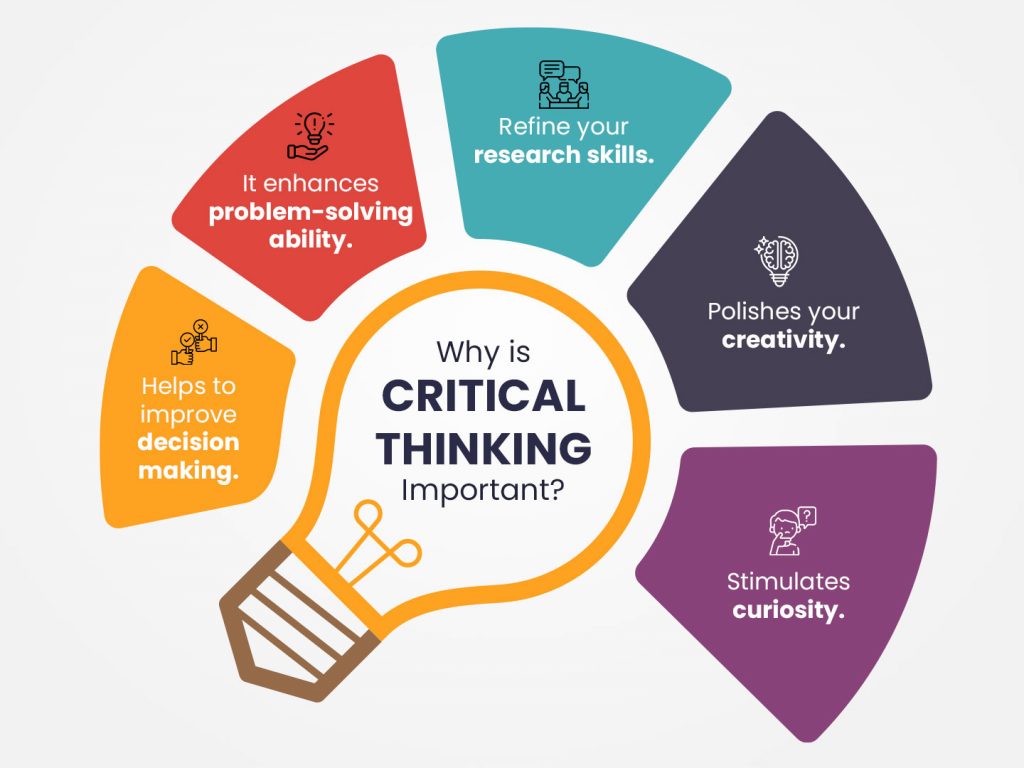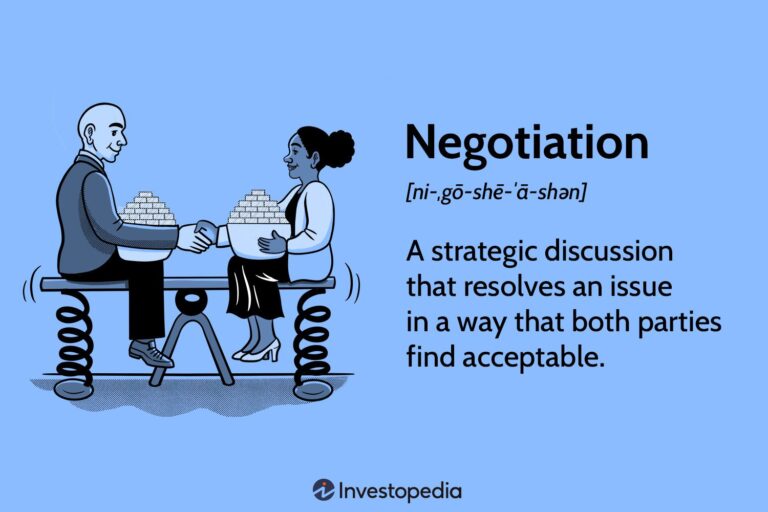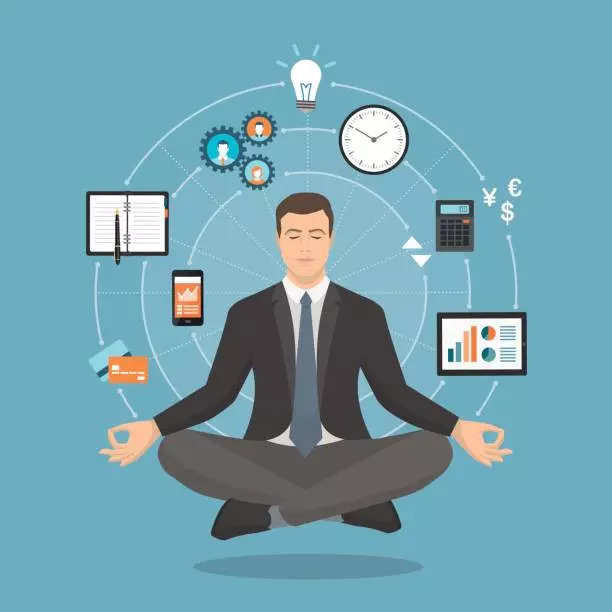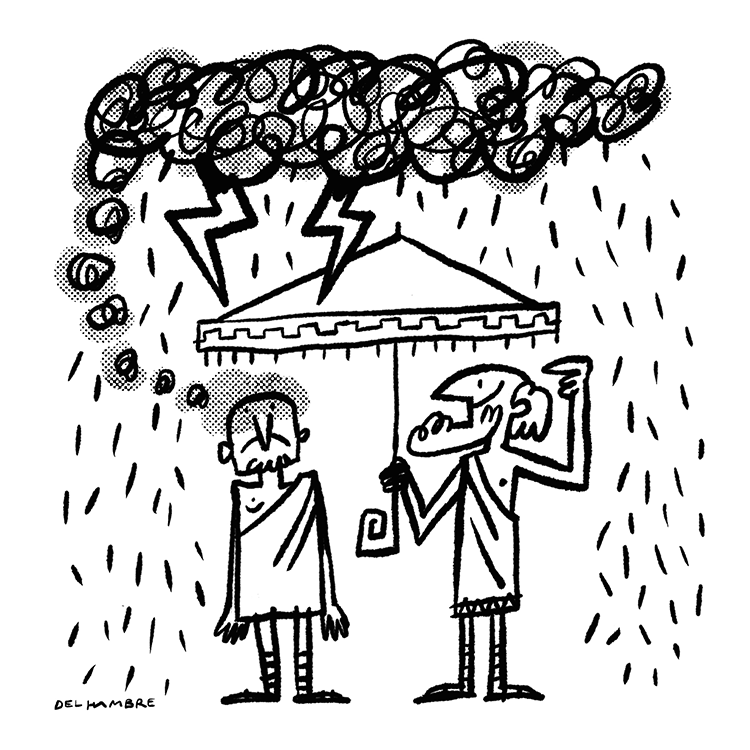How to Develop Critical Thinking Skills
To develop critical thinking skills, practice analyzing information objectively and questioning assumptions. Engage in reflective thinking to enhance decision-making.
Critical thinking is essential for problem-solving and making informed decisions. It involves analyzing information, evaluating evidence, and questioning assumptions. Developing these skills can improve personal and professional life. Start by exposing yourself to diverse perspectives and challenging your viewpoints. Engage in discussions that require deep thinking and reasoning.
Reading extensively and staying curious also contribute to sharpening critical thinking abilities. Practice reflective thinking to understand your thought processes and biases. By consistently applying these strategies, you can cultivate strong critical thinking skills that aid in effective decision-making and problem-solving.
Introduction To Critical Thinking
Critical thinking helps us make good decisions. It involves analyzing facts and forming judgments. We all need this skill in life.
Learning critical thinking starts with understanding its importance. It also helps to see how we use it every day.
Importance Of Critical Thinking
Critical thinking improves problem-solving skills. It helps us understand situations better. We make better choices with this skill.
- Helps in making informed decisions.
- Aids in solving complex problems.
- Encourages independent thinking.
- Boosts creativity and innovation.
Everyday Applications
We use critical thinking every day. It helps in planning our day. It helps in choosing healthy foods. It helps in understanding news.
Here are some everyday applications:
| Situation | How Critical Thinking Helps |
|---|---|
| Shopping | Comparing prices and quality. |
| School Projects | Researching and organizing information. |
| Friendship Issues | Understanding different viewpoints. |
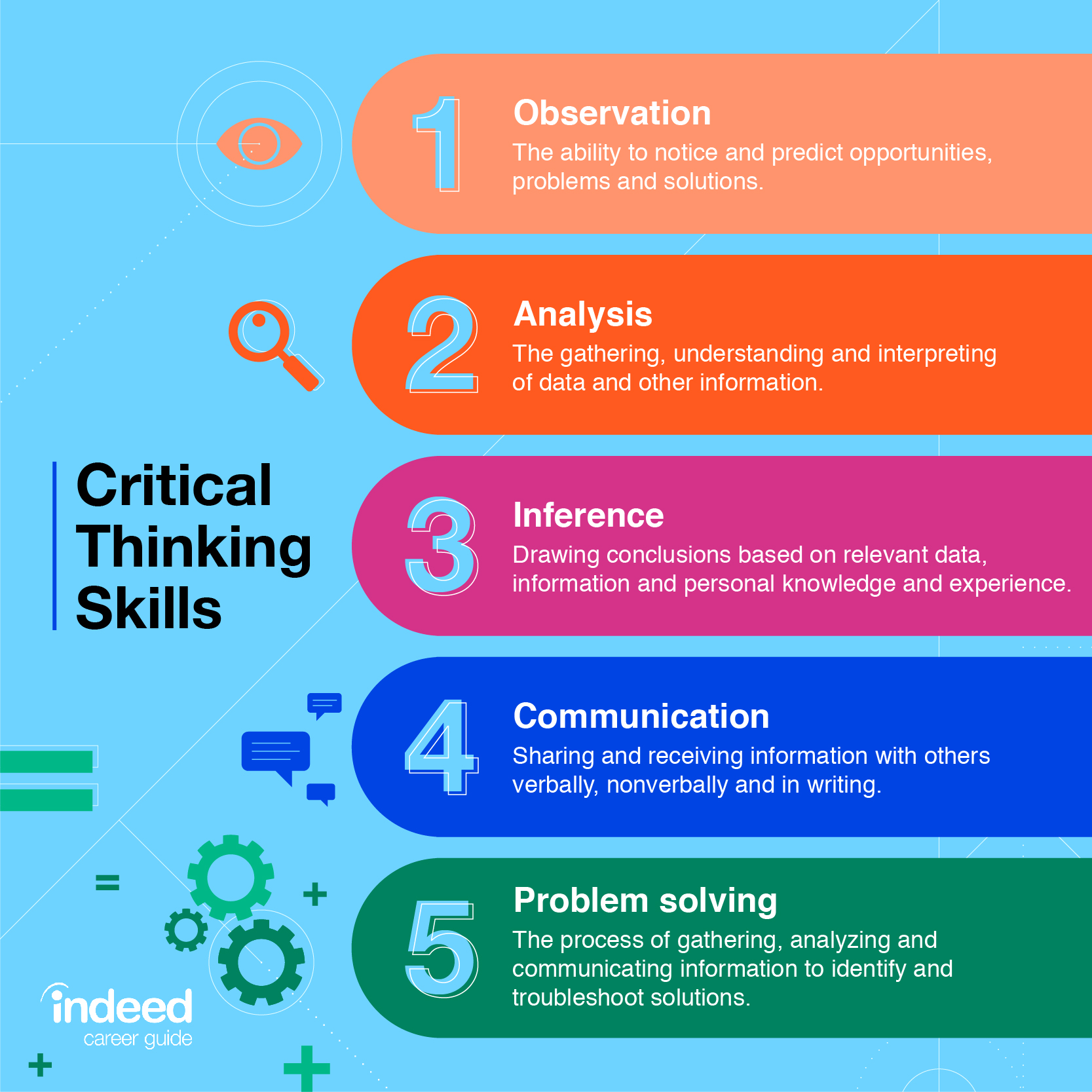
Credit: www.indeed.com
Core Principles
Developing critical thinking skills involves understanding the core principles. This section will dive into the fundamentals of objectivity and questioning assumptions. These principles are essential for honing your critical thinking.
Objectivity
Objectivity means seeing things as they are. It involves removing personal biases. Here are steps to practice objectivity:
- Avoid Emotional Influence: Keep emotions separate from facts.
- Use Data: Base decisions on data, not feelings.
- Seek Multiple Views: Consider different perspectives to get a full picture.
| Action | Description |
|---|---|
| Identify Bias | Recognize personal biases in your thinking. |
| Use Evidence | Support your thoughts with concrete evidence. |
| Stay Neutral | Approach each situation without preconceptions. |
Questioning Assumptions
Questioning assumptions is key to critical thinking. It involves challenging the status quo. Follow these steps to practice:
- Identify Assumptions: Recognize what you take for granted.
- Ask Questions: Why do you believe something is true?
- Seek Evidence: Look for proof to support or refute your beliefs.
Consider the following example:
Assumption: "All dogs are friendly."
Question: "Are there any dogs that are not friendly?"
Evidence: Look for reports or studies on dog behavior.
By questioning assumptions, you uncover deeper truths. This helps you think more critically.
Analyzing Information
Critical thinking is the key to understanding the world. One must analyze information carefully to make informed decisions.
This section will help you to evaluate sources and distinguish between facts and opinions.
Evaluating Sources
Not all sources are reliable. It’s important to check the credibility of the information you find.
- Author: Who wrote it? Are they an expert?
- Date: Is the information current or outdated?
- Publisher: Is the source from a trusted organization?
Always cross-check information from multiple sources. This helps to ensure accuracy.
Fact Vs. Opinion
Understanding the difference between facts and opinions is crucial. A fact is a statement that can be proven true. An opinion is a belief or judgment that cannot be proven.
| Fact | Opinion |
|---|---|
| The Earth orbits the Sun. | Chocolate is the best ice cream flavor. |
| Water boils at 100°C. | Summer is the best season. |
Question statements you read or hear. Determine if they are facts or opinions.
Developing Curiosity
Curiosity is the heart of critical thinking. It drives us to ask questions and seek answers. Developing curiosity helps us explore new ideas and understand different perspectives. Here are some practical ways to nurture your curiosity.
Asking The Right Questions
To develop curiosity, start by asking the right questions. These questions should be open-ended, encouraging deeper thought.
- What if?
- Why does this happen?
- How can this be improved?
These questions help you dive deeper into a subject. They prompt you to seek more information and understand the topic better.
Seeking Diverse Perspectives
Another way to develop curiosity is by seeking diverse perspectives. Expose yourself to different viewpoints and ideas.
Read books, watch documentaries, and talk to people from various backgrounds. This broadens your understanding and stimulates your curiosity.
Consider the following sources to gain diverse perspectives:
| Source | Type |
|---|---|
| Books | Fiction, Non-fiction |
| Documentaries | History, Science, Culture |
| Conversations | Family, Friends, Colleagues |
Engage with these sources regularly. This practice will enhance your critical thinking skills by exposing you to a variety of thoughts and ideas.
Logical Reasoning
Developing critical thinking skills is essential in our daily lives. One key component is logical reasoning. This helps us make better decisions and solve problems. Let’s explore how to enhance logical reasoning skills.
Understanding Arguments
Arguments are the foundation of logical reasoning. They consist of premises and a conclusion. The premises provide support for the conclusion. To understand arguments, identify these components.
| Component | Description |
|---|---|
| Premise | A statement that supports the conclusion. |
| Conclusion | A statement that follows from the premises. |
Let’s look at an example:
Premise: All humans need water to survive.
Premise: John is a human.
Conclusion: John needs water to survive.
By breaking down arguments this way, we can evaluate their validity and strength.
Recognizing Fallacies
Fallacies are errors in reasoning that weaken arguments. Recognizing them is crucial for sound logical reasoning. Here are some common fallacies:
- Ad Hominem – Attacking the person instead of the argument.
- Straw Man – Misrepresenting an argument to make it easier to attack.
- False Dilemma – Presenting two options as the only possibilities.
- Slippery Slope – Arguing that one small step will lead to a chain of events.
For example:
Fallacy: "You can't trust John's argument on climate change because he isn't a scientist."
This is an Ad Hominem fallacy. It attacks John instead of addressing his argument.
Problem-solving Techniques
Developing critical thinking skills involves mastering various problem-solving techniques. These techniques help in understanding and addressing complex issues. Let’s explore some effective methods to enhance your problem-solving abilities.
Breaking Down Complex Issues
Complex problems can feel overwhelming. Breaking them down into smaller parts makes them manageable.
- Identify the core issue.
- List all contributing factors.
- Analyze each factor separately.
- Look for patterns and connections.
By dissecting the problem, you can find the root cause. This helps in forming a clear strategy to tackle it.
Creative Solutions
Thinking outside the box leads to innovative solutions. Creativity boosts problem-solving skills.
- Brainstorm ideas without judging them.
- Encourage diverse perspectives.
- Combine different ideas to form new solutions.
- Test and refine your solutions.
Creative solutions often come from unexpected places. Keep an open mind and explore all possibilities.
| Technique | Benefit |
|---|---|
| Breaking Down Issues | Identifies root causes |
| Creative Solutions | Generates innovative ideas |
Reflection And Feedback
Reflection and feedback are crucial for developing critical thinking skills. Through reflection, you can review your thoughts and actions. Feedback helps you see different viewpoints and improve.
Self-assessment
Self-assessment is a key part of reflection. Evaluate your own work and thoughts. Ask yourself questions like:
- Did I consider all sides?
- What was my main point?
- How could I improve?
Use these questions to guide your reflection. Write your answers in a journal. This helps you track your progress over time.
Learning From Mistakes
Mistakes are valuable for learning. Every mistake is a chance to grow. Follow these steps to learn from mistakes:
- Identify the mistake.
- Understand why it happened.
- Think about how to avoid it next time.
Feedback from others can help. Ask someone you trust to review your work. They can point out mistakes you missed. Use their feedback to improve.
Practical Exercises
Developing critical thinking skills is essential for problem-solving and decision-making. Practical exercises can enhance these skills effectively. Here, we explore two key exercises: Mind Mapping and Debates and Discussions.
Mind Mapping
Mind mapping is a visual tool that helps organize thoughts. It involves creating diagrams to connect ideas and concepts. This technique engages both hemispheres of the brain, fostering creativity and logic.
To start, write a central idea in the middle of a blank page. Draw branches extending from this central idea. Each branch represents a related subtopic or concept. Add more branches to explore these subtopics in detail.
Mind mapping encourages the breakdown of complex ideas into manageable parts. It helps in identifying connections between different concepts. This exercise enhances understanding and retention of information.
Here are steps to create a mind map:
- Choose a central idea or problem.
- Write it in the center of a page.
- Draw branches to subtopics or related ideas.
- Add details to each branch.
- Use colors and images to enhance the map.
Debates And Discussions
Debates and discussions are powerful tools for developing critical thinking. They involve presenting arguments and counterarguments on a topic. This interaction fosters deeper understanding and perspective-taking.
Engaging in debates improves reasoning and articulation skills. It forces one to consider multiple viewpoints. This exercise helps in evaluating evidence and constructing logical arguments.
To conduct an effective debate or discussion:
- Choose a relevant and thought-provoking topic.
- Assign roles or sides to participants.
- Encourage research and preparation.
- Set rules for respectful and constructive dialogue.
- Moderate the discussion to ensure balance.
Debates and discussions can be done in classrooms, workplaces, or online forums. They provide a dynamic environment for practicing critical thinking.
Applying Skills In Real Life
Learning critical thinking is useful. Applying these skills in real life is essential. This section will guide you on using critical thinking skills in everyday situations.
Workplace Scenarios
In the workplace, critical thinking helps solve problems effectively. Let’s explore some common workplace scenarios:
- Team Collaboration: Evaluate different ideas before making a decision. Use logic to analyze each option.
- Project Management: Plan and organize tasks using critical thinking. Identify the most efficient methods.
- Conflict Resolution: Listen to all sides. Assess the root cause and find a fair solution.
| Scenario | Critical Thinking Approach |
|---|---|
| Meeting Deadlines | Prioritize tasks and allocate time wisely. |
| Budget Management | Analyze expenses and find cost-effective solutions. |
Personal Decision Making
Critical thinking also plays a vital role in personal decisions. Here are some examples:
- Health Choices: Research and compare before making health-related decisions.
- Financial Planning: Assess your income and expenses. Create a balanced budget.
- Relationship Issues: Communicate openly. Evaluate the situation from multiple perspectives.
Using critical thinking in personal life improves decision quality. It ensures you make informed choices.

Credit: www.learningscientists.org
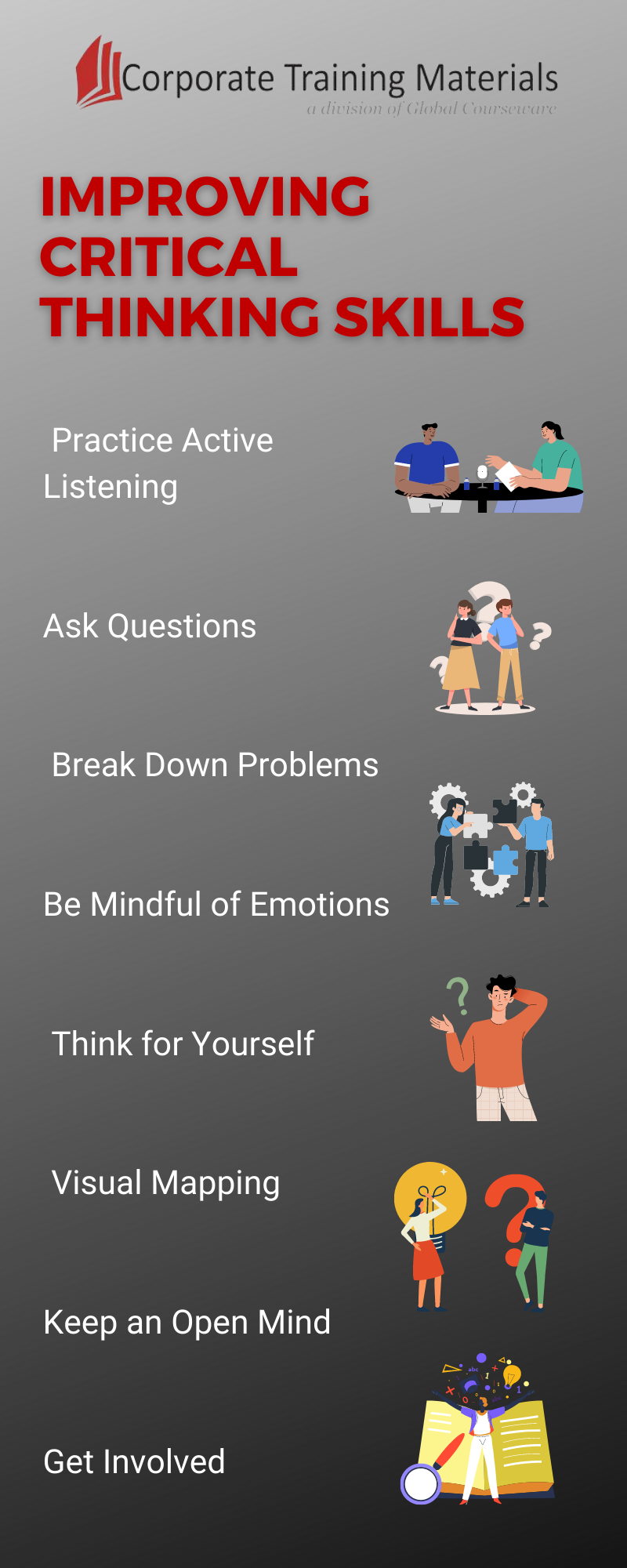
Credit: corporatetrainingmaterials.com
Conclusion
Mastering critical thinking skills can greatly enhance decision-making and problem-solving. Practice regularly to see improvement. Engage in discussions, question assumptions, and stay curious. These habits will help you think more critically. Remember, it’s a continuous journey. Keep challenging your mind to grow and improve.
